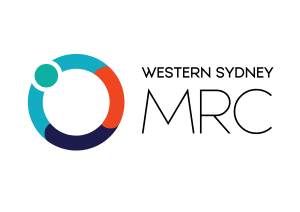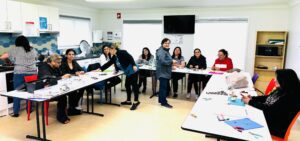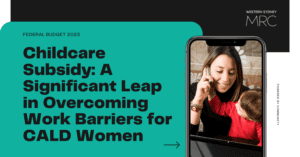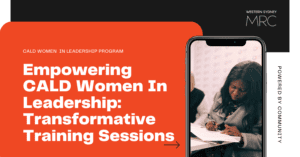Submission to the Joint Standing Committee on Migration: Inquiry into settlement outcomes
Background on Liverpool MRC
The Liverpool Migrant Resource Centre welcomes the opportunity to make this submission to the Joint Standing Committee on Migration and the opportunity to reflect on the efficiency and effectiveness of our service and the settlement sector more broadly.
The Liverpool MRC works with newly arrived migrants, refugees, and diverse communities by building their capacity to take part in local life in Liverpool and beyond. The Liverpool MRC is a community based non‐profit organisation established to actively and directly relieve and empower those whose social condition renders them disadvantaged. The Liverpool MRC aims to build capacity, capability, competence and independence by actively and effectively assisting in social inclusion and integration through information, referrals, casework, group work, and community development.
The Liverpool MRC delivers a cross-section of settlement services including, but not limited to Settlement Service Program (SSP); Complex Case Support (CCS); Community Proposal Pilot (CPP); youth services including individual case support, homework support and information sessions; Community Visitors Scheme (CVS); Cultural Connect playgroups; employment programs; women’s group; volunteer-run English classes; information sessions; and various community development projects.
The Liverpool MRC’s response will address the terms of reference provided by the Joint Committee. It will also address comments pertaining to the adequacy of the Migration Act 1958 character test and social engagement of migrant youth.
Terms of Reference
The Joint Standing Committee on Migration shall inquire into and report on migrant settlement outcomes with reference to:
The mix, coordination and extent of settlement services available and the effectiveness of these services in promoting better settlement outcomes for migrants;
Australia’s migrant settlement program is recognised internationally for its effectiveness, coordination and adaptability. HSS, SSP and CCS programs provide a thoroughly coordinated and responsive service providing humanitarian migrants tailored, multi‐level support in line with settlement outcomes. Within the scope of settlement programs, up to five years after arrival, these services work to the diverse and complex experience of settlement, recognising that there is no uniform experience of settlement.
The Liverpool MRC considers that the current mix and extent of settlement services effectively and comprehensively meets the needs of its client base. The coordination and communication between core settlement services such as Humanitarian Settlement Services (HSS), SSP, CCS, NSW Service for the Treatment and Rehabilitation of Torture and Trauma Survivors (STARTTS), Translating and Interpreting Service (TIS) and Adult Migrant English Program (AMEP) providers effectively facilitates interagency access towards positive settlement outcomes.
The Liverpool MRC’s SSP and CCS programs successfully support and facilitate community capacity building and independence. The Liverpool MRC information and referral services saw over 9000 requests for support in the 2015/16 financial year, with close to 3000 one‐to‐one casework sessions and almost 1000 clients assisted through casework support. These figures represent a doubling of figures from the previous year, with projections for the next period expecting further increases as additional Syrian intake exit HSS casework and enter SSP eligibility.
The Settlement Council of Australia (SCoA) and Migrant Integration Policy Index (MIPEX) each use similar indicators of successful resettlement and integration across employment, family, education, health, political participation, permanent residence, access to justice, language acquisition and anti-discrimination policy. The Liverpool MRC and settlement sector more broadly provide migrants with the tools, capacity and independence to integrate into Australian society. The settlement sector consistently delivers excellent services to new migrants, that meets and exceeds settlement outcomes. The Liverpool MRC notes that long‐term settlement goals, such as civic participation and anti‐discrimination policy, are the shared responsibility of settlement services and the broader Australian community. That is encompassing all tiers and levels of government (including policymakers), the business sector, and the community sector.
A fundamental element of successful and effective settlement service delivery that the Liverpool MRC exemplifies is an excellent capacity for building social capital amongst the community – both within the target communities (e.g. recent arrivals), and the community-at-large. This ethos is ingrained in the Liverpool MRC’s work, informing the strategy of service provision and community engagement. Successfully facilitating social capital amongst migrant communities relies on the maintenance of safe and enabling spaces, where the community has access to skilled and experienced settlement workers who work from a holistic (ref. McKinsey Global Institute, 2016), client‐centred approach. The Liverpool MRC service and program staff have bi‐cultural & bi‐lingual skills, experience and qualifications in their relevant fields of operation.
The Liverpool MRC service team acts in a dual capacity as both caseworker and in leadership, mentoring role for clients and their communities, with the majority of Liverpool MRC caseworkers having a lived experience of successful settlement and bilingual capacity. These community links have resulted in the Liverpool MRC successfully establishing itself as a trusted and reliable organisation. This has resulted in the Liverpool MRC often acting as a link for larger organisations seeking to collaborate on programs with the community but lacking community connection.
National and international best practice strategies for improving migrant settlement outcomes and prospects;
Australia’s settlement program is globally recognised for its excellence in delivering consistent, positive outcomes for migrant communities. In addition to oversight and guidance from federal government agencies and legislation, the sectors peak body, Settlement Council of Australia (SCoA), developed the National Settlement Services Outcomes to ensure consistently high service delivery.
The National Settlement Services Outcomes Standards (NSSOS) highlight nine priority areas for the sector to work to, to achieve consistent settlement outcomes and establish best practice benchmarks. The standards adopt a client‐centred approach that applies a human rights lens. The standards outline strategies to facilitate equal, affordable and quality services. They are used as a reference point in the development of community engagement strategies, service delivery guidelines and The Migration Integration Policy Index (MIPEX) provides a tool with which to compare and analyse policies that contribute to settlement and migrant integration, across eight key policy areas including labour market mobility, education, health and political participation. Such review of Australia’s integration performance placed it 8th of 38 countries reviewed in 2015, covering EU member states, USA, Norway, New Zealand and Switzerland. The key Australian policies that MIPEX highlighted as contributing to Australia’s excellence was its commitment to equality, non‐discrimination, settlement services, and multiculturalism.
On a local level, the Liverpool MRC was instrumental in forming the Localised Action Plan (LAP), a collaborative interagency effort to respond to increased humanitarian intake in the Liverpool area, spearheaded by the Liverpool City Council and the Liverpool MRC. It facilitates work between local and State governments in partnership with local service providers to improve the sector response to increased humanitarian intake to the South West Sydney area. The LAP covers areas of health and wellbeing, youth, education, employment, and social inclusion.
The importance of English language ability on a migrant’s, or prospective migrant’s, settlement outcome;
The importance of English language acquisition is noted across NSSOS and federal government outcomes, with links to improved employment outcomes, economic contribution and social participation for migrants. However, the Liverpool MRC wishes to highlight that English language acquisition is one aspect of successful resettlement, not the defining aspect.
The Liverpool MRC has found that its client base has a significant commitment to learning English, attending AMEP classes with enthusiasm. However, a substantial number have noted the lack of opportunity to practice English with native English speakers, particularly with regards to key contextual situations such as social/conversational, the workplace, accessing services, transactions, seeking employment, etc. Indeed, the Liverpool MRC has fielded many requests to facilitate initiatives that would connect English speakers and new migrants. Generally speaking, adult and youth migrants have different experiences of language acquisition, with youth and children often acquiring language skills faster due to exposure in schools and their developmental dispositions. This can result in children and youth acting as translators for their parents, placing significant pressure on them.
The Liverpool MRC notes the widely differing rates of language acquisition for migrant communities, and thereby the lack of adaptability to effectively respond to these variances, due to funding restrictions and resource constraints. Increased flexibility in accessing services, particularly English language programs (such as AMEP), is critical. Particularly for migrants with complex settlement experiences, such as carers or single mothers with young children. Increased government support and funding towards community-based initiatives to provide this flexibility and responsiveness is crucial.
Regarding migrants who arrive under humanitarian and family reunion programs, the Liverpool MRC rejects the suggestion that English capacity should be used as an indicator for prospective settlement outcomes. Throughout the humanitarian migrant settlement journey, the Liverpool MRC has consistently observed the enthusiasm, drive and effort this category of its clientele make, in order to learn, practice, and grasp English proficiency, whilst negotiating a myriad of resettlement demands. Where clients may demonstrate significant delays in language acquisition, this can often be linked to disrupted education, trauma impact, complex settlement issues, and/or serious health concerns. Further, delays or difficulties in acquiring language skills does not indicate failed settlement, as clients still robustly engage with other indicators of settlement such as health and wellbeing, negotiating transport, and access to housing.
Whether current migration processes adequately assess a prospective migrant’s settlement prospects;
The Liverpool MRC holds concerns over potential additions to the pre‐migration assessment process that would seek to determine settlement prospects. Pre‐migration circumstances do not implicate post-arrival outcomes. It is implausible to assess, beyond existing means, the potential of individual settlement prospects and risks simplifying a complex and nuanced service to one based on limited indicators of ‘successful settlement’.
The existing assessment of migrants prior to arrival covers a thorough range of criteria, across criminal history and comprehensive health checks. The Liverpool MRC understands that skilled migrants are assessed on the basis of their capacity to fill labour market demands and as such have alternative requirements of settlement prospects. However, existing migration processes for humanitarian and family reunion programs adequately capture the required information, e.g. health concerns and criminal history, without further restricting the grounds upon which migrants can enter Australia.
The Liverpool MRC notes extensive research that highlights significant migrant contributions in Australia, economically and politically, who were assessed under current migration processes. Research points to the success of skilled migrants in filling labour market vacancies, in line with settlement expectations. Humanitarian entrants display high levels of social contributions, starting within their own communities and expanding to the broader community with time. Second generation humanitarian migrants present with higher levels of engagement with education and employment than their Australian counterparts (CRC, 2011, The Economic Advantages of Cultural Diversity in Australia; DIAC, 2011, A Significant Contribution). This is noted to highlight the effectiveness of existing migration processes as well as the effectiveness of settlement services in supporting migrant communities.
Any other related matter.
The Liverpool MRC takes this opportunity to note the high number of requests for support received by migrant groups not eligible for our support due to eligibility restrictions intrinsic to the various settlement programs, e.g. predominantly post‐SSP clients experiencing arising complexity, and temporary visa holders, such as SHEV and TPV. As such, the Liverpool MRC welcomes the opportunity to work with clients beyond and outside of SSP eligibility (5 years) to providing settlement support for migrant groups who may require additional support for a surer settlement outcome. This, of course, requires a corresponding increase in funding. The Liverpool MRC contends that the number of requests for support, over and above the specifics of the settlement program, point to the complexity of the settlement journey, particularly in relation to change in life circumstances, such as aged care, respite, chronic illness and parenting support, particularly for parents of teenagers, and young people coming of age. Indeed, positive settlement outcomes requires coming to grips that settlement touches on all stages of persons’ lifespan development.
Additionally, the Liverpool MRC would welcome the opportunity to expand employment programs and services, in line with government priorities, to further support the migrant community. The Liverpool MRC currently runs its Lead the Way project. It is an intensive employment readiness program that pairs participants with skilled mentors from the participants’ field of interest and capacity, facilitating connection to professional networks and advice. However, the Liverpool region has been repeatedly overlooked with regards to youth‐targeted employment programs for federal funding including the ‘fully subscribed’ Youth Employment Pathway (2016), through the Industry Skills Fund, and the Youth Transition Support pilot program (2016). Without these vital streams of funding to the Liverpool area, the Liverpool MRC has limited capacity to respond to growing needs amongst youth communities.
Finally, the Liverpool MRC wishes to provide a comment on the restrictive deadline provided for this inquiry. The broad terms of reference and additional comments requiring a response, several weeks of the deadline falling on national public holidays and over periods of a traditional office closure, put the organisations providing response at a disadvantage, limiting capacity to thoroughly consult with communities.
The Committee shall give particular consideration to social engagement of youth migrants, including involvement of youth migrants in anti‐social behaviour such as gang activity, and the adequacy of the Migration Act 1958 character test provisions as a means to address issues arising from this behaviour.
The Liverpool MRC recently commissioned a youth consultation towards establishing a cohesive youth strategy to inform its work. The findings of the consultation highlight the need for additional investment in family and social support, with a focus on intercultural understanding and mentoring. It went on to note the complexity of the experience of migrant youth (first, second and third-generation) who negotiate personal trauma, intergenerational trauma, cultural identity and, often, socioeconomic disadvantage.
The youth engaged in the consultation suggested an increase in opportunities to socialise with groups from different suburbs and locations to break down barriers and reduce fear and incidence of violence. This correlates with ongoing requests for additional group activities, such as sport and arts-based initiatives. The Liverpool MRC is constrained by funding limits in its capacity to respond to such requests. The current humanitarian intake to the Liverpool region has a high youth demographic. Additionally, there is a high number of children (6‐11 years of age) in recent intakes, inclusive of Australia’s additional Syrian intake, indicating substantial growth in demand for youth services in Liverpool in the coming years.
In the Liverpool MRC experience, intensive, early intervention, culturally appropriate programs are key to addressing anti‐social behaviour of youth. Such programs require long term funding. Additionally, such programs need to have to full support of local police, with less emphasis on ‘heavy handed’ enforcement and policing, which serves to emphasise perceptions of exclusion and isolation that all youth are vulnerable to, and at the heart of anti‐social behaviours. The Liverpool MRC has seen extensive evidence of the negative impact of disrupted education amongst migrant youth, who may have missed years of schooling due to pre‐migration circumstances, such as prolonged time in a refugee camp or informal settlements. Without adequate support to re‐engage with education and goal setting this cohort is particularly vulnerable. The Liverpool MRC has seen the significant and lasting impact of one‐to‐one support, that provides a safe space for youth to explore issues and approach new ideas for solutions and re‐engagement.
The Liverpool MRC works holistically with youth clients, often engaging the whole family in support, aiming to address the numerous issues that feed into youth experience. A recent case study that highlights this support, as well as the complexity of engaging youth within a complex family and cultural dynamic, is available in Appendix 1. The Liverpool MRC notes the high number of requests for parenting support from its client base, as well as support for programs that engage community leaders and groups in mentoring youth.
The Liverpool MRC is constrained by funding limits in its capacity to respond to such requests. However, with additional funding and resourcing, the Liverpool MRC is well placed to deliver additional youth-targeted programs with existing community support and demand, across multiple entry points, such as schools or youth centres.
The Liverpool MRC rejects the implication that ethnicity or migrant status indicate a predisposition to engaging in criminal or anti‐social behaviour. Such implications do not acknowledge the complex intersection of issues (socio‐economic, social exclusion, lack of opportunity, limited access to education) that can lead to engagement in anti‐social behaviour.
Engagement with criminal or antisocial behaviour is not a result of ethnic background or religion. Rather, anti‐social behaviour amongst youth born in Australia reflects issues of social exclusion (racism, bullying, homelessness, absence of mentors), lack of sense of belonging and socio‐economic disadvantage. It is not a reflection on the adequacy of settlement services. Indeed, sampling at the deeper end of youth disaffection reproduces and perpetuates overly skewed discourses of non‐integration (especially as propounded by tabloid media), and detracts from the findings of grounded empirical research (e.g. Dunn, et. al., 2015), from good social policy and programs, and the prospect of positive settlement outcomes. These skewed discourses on the other hand may militate against such outcomes by contributing to the atmospherics of exclusion and abjection.
The Liverpool MRC contends that there is no strong rationale to change character test provision. In its existing form, the character provision grants the Department and Minister significant discretionary power.
Direct references
- Migrant Integration Policy Index, 2015, viewed 18 January 2017 at Settlement Council of Australia, 2015, National Settlement Services Outcomes Standards.
- Community Relations Commission, 2011, The Economic Advantages of Cultural Diversity in Australia.
- Department of Immigration and Citizenship, 2011, A Significant Contribution: The Economic, Social and Civic Contributions of First and Second Generation Humanitarian Entrants.
- Prof Kevin Dunn, et. al., 2015, The Resilience & Ordinariness of Australian Muslims: attitudes and experiences of Muslims Report, Western Sydney University.
- Jonathon Woetzel, et. al., 2016, People on the Move: Global Migration’s Impact & Opportunity, McKinsey Global Institute.
Additional sources that informed submission
- Prof Andrew Markus, 2016, Mapping Social Cohesion: The Scanlon Foundation surveys, The Scanlon Foundation.
- Productivity Commission, 2016, Migrant Intake into Australia, Inquiry Report.
- Joint Standing Committee on Migration, 2016, Public Hearing: Mr Les Twentyman, Wednesday 23 November 2016.
- Rob White, 1992, Young People, Community Space and Social Control, National Conference on Juvenile Justice: Adelaide South Australia.
- Rob White, 2007, Youth gangs, violence and anti‐social behaviour, Australia Research Alliance for Children and Youth.
Appendix 1
Case Study
The Liverpool MRC’s Complex Case Support program worked successfully with a family of five, viz. a single mother and her four children. The caseworker (CW) provided extensive support and advocacy for the family, demonstrating the diligence and efficacy of the CCS program, the effectiveness of advocacy in supporting clients to achieve settlement outcomes, and collaboration within and across the sector. It also demonstrates the complex experience humanitarian migrants negotiate, particularly highlighting the vital need for holistic, intensive and early intervention youth support to address behavioural concerns.
At the beginning of case support, the client’s two teenage sons, aged 14 and 16, were regularly suspended from school due to behavioural issues and exhibiting concerning behaviour outside of school. The CW provided extensive advocacy and support within the school, which resulted in:
- connection to an in‐school mentor,
- placement in an in‐school work experience program,
- adaptations to the difficulty of work they were given, with consideration for their disrupted
- education, and
- a rewards program with a focus on positive reinforcement.
The two sons were referred to a youth worker, who built a positive relationship them and provided support to address behavioural issues. Additionally, the CW provided information to the family around alternative educational options such as TAFE, with one of the sons signing up for White Card training, with a view to working in construction.
The CW supported the client’s 18 year old daughter, who had vision impairment. The family had limited understanding of the daughter’s vision issues and were therefore unable to access appropriate support. The CW supported the family through the daughter’s diagnosis as being legally blind and began navigating appropriate support services. The CW was then able to support the daughter to access age appropriate services, such as local youth centres and social activities.
Concurrent to support provided to the client’s children, the CW provided support to the mother to improve her capacity and independence. This included financial planning and budget support, referrals to English language support, therapeutic mental health support and the Liverpool MRC’s women’s group.







